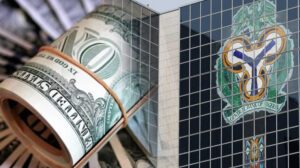Uncertainty over Naira uniform exchange rate
Declining liquidity crunch is conspiring with activities of speculators to undermine the efforts of the President Tinubu-led Federal Government to achieve stability in the nation’s foreign exchange market contrary to the intent of the forex reform.
This has seen the local currency maintain a disturbing slide against the greenback, raising concerns among analysts that the policy step of exchange rate unification may prove a dangerous route for Nigeria’s current economic realities.
The Central Bank of Nigeria (CBN), had shortly after the inauguration of Tinubu Administration collapsed the multiple exchange rates into the investors and exporters (I&E) window, ending a regime that had for long provided a fertile ground for round-tripping and other forms of currency sabotage.
It also raised hopes that the nation’s foreign exchange market would see a level of sanity that would boost investors’ confidence and attract both foreign portfolio investment (FPI) and foreign direct investment (FDI). But this has not been the case.
The naira on Friday ended the week losing against the dollar, exchanging at N775.76, at the Investors and Exporters window. The local currency lost 0.93 per cent compared to N768.60, which it exchanged for the dollar on Thursday. The naira also maintained its downward trend against the dollar at the parallel market, trading between 876/$ and 876/$ within the week under review.
However, speaking at the end of the two-day Monetary Policy Committee meeting that ended in Abuja on Tuesday, acting governor of CBN, Mr. Folashodun Shonubi, assured that the apex bank would address the demand pressure on the country’s exchange rate.
Shonubi said, “The market needs to find its level. There is pent-up demand, for which the market cannot cater. Once we clear this demand, the volatility will normalise. We have started intervening, and we would continue to intervene until the market gets to our level.”
In the same direction, Chief Executive Officer, Centre for the Promotion of Private Enterprise, (CPPE), Dr. Muda Yusuf, said the foreign exchange market was evidently under pressure, as a result of a number of factors, including a surge in monetary expansion in the last month.
In a statement sent to newsmen, Yusuf said, “Money supply grew by an unprecedented 15 per cent in one month between May and June 2023. Broad money grew by over N9tn, from N55.7tn to N64.9tn. This surge in monetary growth is unprecedented. Obviously, this must have had an effect on the exchange rate.”
He called on the monetary authorities to investigate this drastic growth in money supply and take steps to curb subsequent expansion, stressing that such dramatic growth in money supply “poses a significant risk to macroeconomic stability, especially price stability.”
According to him, over the last few years, there had been a cumulative backlog of unmet foreign exchange demand running into billions of dollars as a result of acute illiquidity in the foreign exchange market.
He said with a more liberalised forex market, the pressure of the backlog of unmet demands and other maturing forex-related obligations had been unleashed on the investors’ and exporters’ window.
However, the Economic Intelligence Unit (EIU) has predicted in its latest report about the naira that it believes the Nigerian government will go back to a system, where they have more control over the exchange rate, to prevent the local currency from losing its value much further. The Unit pointed out that the CBN, which manages the country’s money, does not have much experience handling a flexible exchange rate system.
The EIU said, “The CBN lacks experience in conducting monetary policy under a float, and the need to control rapidly increasing inflation will become more acute over time.
“Our forecast is finely balanced, but we expect a return to heavier exchange-rate management from the second half of 2023 as the naira slides beyond N800:US$1 from N770:US$1 in early July.”
The research and analytical firm argued that there is currently a shortage of foreign currency in the country, especially when it comes to fulfilling demands for foreign exchange through Form A and M. This, combined with speculators taking advantage of the situation, might push the CBN to step in more and “intervene” in the market, especially since about 98 percent of their foreign reserves are in cash.
However, the EIU noted that Nigeria’s foreign reserves are still relatively liquid, which means they can pay for imports for, at least, another six to eight months. Some analysts believe this gives the government enough time to increase revenue, stop financial leaks, and pay off some debts.
The report also projected that because of the unstable exchange rate and how it affects people’s lives, the naira will lose its value more slowly than expected in the medium to long term. They estimated that the average rate will be “N815 to US$1 in 2024” and will further decline to “N1,018 to US$1 by the end of 2027”. This is around 10 to 15 percent less than what the black-market exchange rate would be during the same period.
Similarly, the Group Chief Executive Officer of Cowry Assets Management, Mr. Johnson Chukwu, expressed concern over the lack of stability in Nigeria’s currency exchange rate system, attributing it to the fall in the value of the the naira.
Chukwu, who spoke at the Lagos Business School on Thursday, emphasised the importance of stability in the exchange rate, as it plays a vital role in boosting people’s confidence. When the exchange rate is unstable, it creates uncertainty, leading to a loss of confidence among investors and even causing panic, he said.
He said achieving some level of stability in the exchange rate is crucial for economic agents, saying individuals and businesses are less concerned about the specific rate, but they value the ability to rely on a stable exchange rate.
“The fact is that the exchange rate has not been able to achieve some level of stability,” Chukwu said. “Because for economic agents, it doesn’t really matter what the rate is; what matters most is that it must be able to create some level of stability.
“Because if you have that level of instability, you will create uncertainties, and because of those uncertainties, we are leading to a loss of confidence or panic that has actually set in.”
Chukwu pointed out that increasing the supply of major international currencies like the US dollar would have helped harmonise the exchange rate system, reducing the gap between official and parallel market rates. This harmonization, he said, would have benefited the country by bringing the parallel market rate closer to the official exchange rate.




